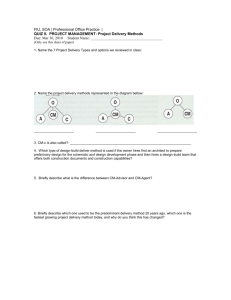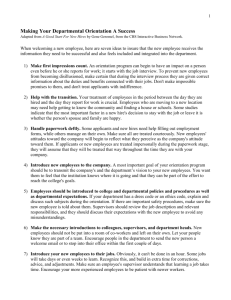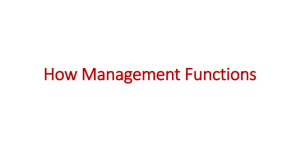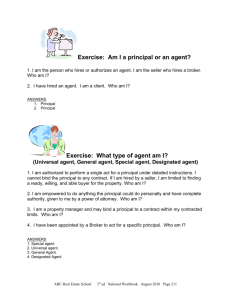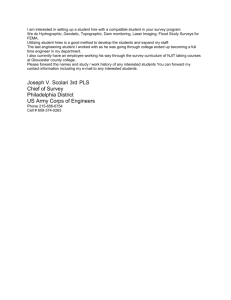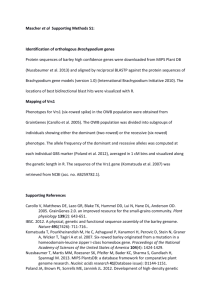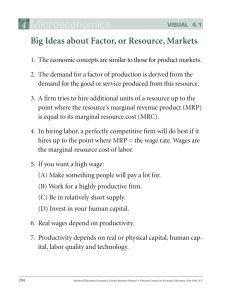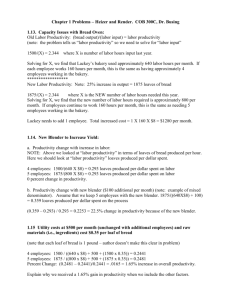1. A firm that hires workers to maximize... productivity. Answer: False
advertisement
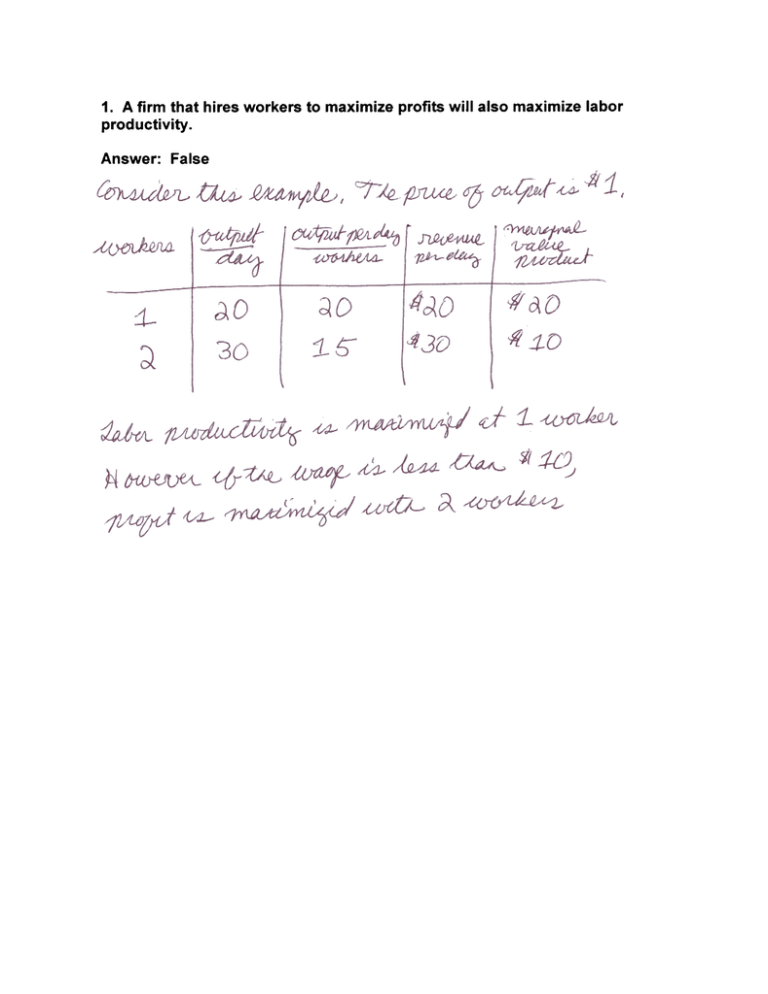
1. A firm that hires workers to maximize profits will also maximize labor
productivity.
Answer:
False
~
2. If the demand for labor is price inelastic and the minimum wage exceeds
the competitive equilibrium wage, an increase in the minimum wage will
increase the total wages of employed workers.
Answer: True
UJ...
~A.
.~.,.(;1..2I.4V
~
-.t/\.e.>
12M..Ge..."0 ~~
,~)-o~f
.I
J71?\,.~
A/).J,p",,'JI..
~
"u.
,(;.4.4£)
~
tl...".,(
J'\,t...{).eo1'1ML
.(.A...
a/t1-
...l""'L.cIl..a~
~?'YU/ft..t./1)'~t.>
AO-tV\
0 ~fa
~
/'
'611
L ~ej
La.bt9y
/
1
""
MJ~
/
~ 0/11{«01-
/
41'
../
1:::'\.-' 0 e..&.iI'\a
~
fe'f
to""'
,..,
l'
lafd"r
"..
+~h{
~6
~
.Q.11,T1zkl1l!t(
A.,()OW~
~rkeJ';j
Answer: False
~
~t.(~~~.
-dt~~.iIIl
'Ot.l.&11il~
~"1t'14-1\~1
...I.L.~~
fU"""/l.t1tio .,;;
4. Ed's bakery can sell as many loaves of bread as it wishes for a price of
$2 per loaf. To keep calculations simple, let us assume that Ed's only costs
are hired labor. If Ed hires 1 worker, he can produce 200 loaves of bread
per day. If Ed hires 2 workers, he can produce 350 loaves of bread per day.
If he hires 3 workers, he can produce 450 loaves of bread per day. If he
hires 4 workers, he can produce 480 loaves of bread per day. If he hires 5
workers, he can produce 500 loaves of bread per day, and if he hires 6
workers, he can produce 510 loaves of bread per day. If he hires 7 or more
workers, he can still produce only 510 loaves of bread per day. If Ed
increases his work crew from 4 workers to 5 workers, his daily revenue will
increase by:
(a) $100
(b) $40
(c) $60
(d) $20
(e) $120
Answer: B
5. If each worker that Ed hires must be paid a daily wage of $65, how many
workers should he hire per day to maximize his profits?
(a) 3
(b) 2
(c) 4
(d) 5
(e) 1
Answer: A
d
:3
6. Ed's demand function for labor looks like a stairway with horizontal line
segments one unit long at heights of:
(a) $200, $350, $450, $480, $500, and $510
(b) $400, $700,$900,$960, $1,000,and $1,020
(c) $400, $300, $200, $60, $40, and $20
(d) $400, $350, $300, $240, $200, and $170
(e) $200, $175, $150, $120, $100, and $85
Answer: C
~.Jl.()11-'\...
U.-f\-
o.-e...>
.l/~
~400
J'
.!/
~oo
')/117\
I; 1ro
~(o(?
"&.-#0
..f 0-.0 ..t
\
1
'+ "-:J'
~
2>
~~'tot
D
fo
~~
J
7. Dyspepsia, Minnesota has 7 greasy-spoon restaurants. Each restaurant
can hire either one or two workers. The only costs that restaurants have
are labor and materials. Restaurants can hire either 0, 1, or 2 workers. A
restaurant that hires no workers will have no costs. After paying for its
materials and before it pays its wages, a restaurant that hires one worker
will have a net revenue of $125 per day and a firm that hires two workers
will have a net revenue of $175 per day. What is the highest daily wage rate
at which a restaurant would be willing to hire two workers?
(a) $87.50
(b) $175
(c) $125
(d) $50
(e) $25
Answer: D
.-!~~~
~
~
.,Cf~
..t1'dS
I
~ 1- -=il.
5
1J~h.ltr'\,;> iA.J".'f.e..>..~,J.,~
a ..t(.)"t).Il..i.0l4-,
Answer: B
'""I~
..A1.as-
.1Jsv
~
14
.."t<)"O't~)1.d.
~~
9. The supply function for barley is described by the equation Q=P/3 where
P is the price of barley and Q is the amount that will be supplied at price P.
The demand function is described by the equation Q=112-9P where P is the
price of barley and Q is the amount that will be demanded. What is the
competitive equilibrium PRICE of barley?
(a) P=19
(b) P=24
(c) P=12
(d) P=9
(e) P=27
Answer: C
-
33(0
-
-
f
1~
fJ
10. Consumers of barley are trying to persuade Congress that the
competitive equilibrium price of barley is too high and that Congress
should pass a law making it illegal to buy or sell barley at a price higher
than 9. If this law were passed, at the legal maximum price,
(a) supply of barley would exceed demand by 28 units.
(b) demand for barley would exceed supply by 28 units.
(c) supply would equal demand at the legal maximum price.
(d) there would be both excess demand and excess supply.
(e) demand for barley and supply of barley would both fall by 28 units.
Answer: B
51 Q-m4"'~
&-=- j.-1,}-;=-.-;L1-~
q'fJ
-~1
--:::...~ 1-
P.:::.9
~3
-~ q./,
~
-- 31-3
-=-~g
